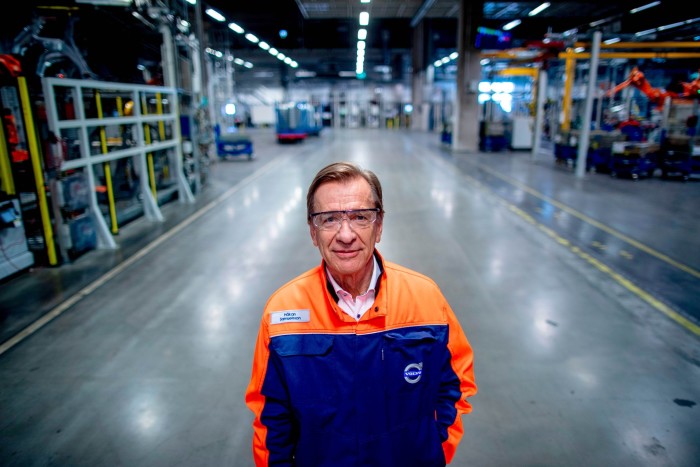Stay informed with free updates
Simply sign up to the Electric vehicles myFT Digest — delivered directly to your inbox.
A year before stepping down as chief executive in 2022, Håkan Samuelsson declared that Volvo Cars would go fully electric by 2030. “Instead of investing in a shrinking business, we choose to invest in the future,” he pledged at the time.
The 74-year-old is now back at the helm of the Swedish group, tasked with navigating the company through an unsteady electric transition and the turbulence caused by a global trade war.
Samuelsson remains defiant even as the company recently pulled its guidance for the next two years and launched a $1.9bn cost-cutting programme following a 59 per cent fall in first-quarter profits.
“We should not change our strategy,” Samuelsson told the FT’s Future of the Car summit this month. “The challenge . . . is really to stay on course and not be distracted.”
The group, which is owned by China’s Geely, last year abandoned its 2030 target to sell only electric vehicles amid slower-than-expected growth in battery-powered cars.
More stories in this report
But demand for EVs has started to pick up again, with worldwide sales up 35 per cent year on year in the first three months of 2025, according to the International Energy Agency. Sales are projected to reach more than 20mn by the end of the year, accounting for one in four cars sold worldwide. Electric cars are expected to reach 60 per cent of total car sales in China, 25 per cent in Europe and 11 per cent in the US.
“We have seen very few people driving an EV going back to an internal combustion engine,” says Michael Lohscheller, chief executive of electric-car maker Polestar. “But of course, certainty in terms of political framework is helpful.”
Sales in the UK and wider Europe have accelerated as carmakers including Renault, Stellantis and Volkswagen have expanded their EV products to meet tougher emissions regulations in the continent.
Cheaper offerings of electric cars below €25,000, such as the Renault 5 and Citroën ë-C3, have also boosted consumer demand, while VW will launch its ID2 — its first EV with a price tag under €25,000 — next year and the even cheaper ID1 in 2027.

But both the EU and the UK have relaxed their regulations related to emissions of combustion-engined vehicles to support the car industry, which has come under fresh pressure from higher tariffs US President Donald Trump has imposed on imports of foreign-made cars and parts.
The European Commission will uphold its ban on the sale of new combustion-engined cars but allow flexibility over the next three years in how carmakers meet stricter CO₂ emission targets entering into force this year. The UK will allow Prius-style hybrids and plug-in hybrid vehicles to be sold until 2035 while lowering punitive fines for failing to meet its EV targets.
“This is a very difficult thing to do — to try and change the second-biggest purchase most people make in a very radical way,” says Richard Bruce, director at the UK Department for Transport’s office for zero-emission vehicles. “Over time . . . you’ll get more and more consumer confidence, and ultimately it’ll work.”
The changes in policy have been divisive for the industry, with critics saying a relaxation of the emissions regulations would make European carmakers less competitive against Chinese rivals, which will push ahead with sales of more affordable, high-tech EVs.
“The EU’s CO₂ limit flexibilities do give some scope for carmakers to relax their sales push in 2025 and we need to see what changes after the US tariffs upheaval,” says Chris Heron, secretary-general of E-Mobility Europe, a Brussels-based trade association. “But a lot of plans are already in place.”
But other car executives say the changes in the emissions regulations do not go far enough to boost the industrial competitiveness of the sector in the face of Chinese competition.
In a joint interview at the FT summit, Stellantis chair John Elkann and Renault chief executive Luca de Meo argued for Europe to have fewer regulations so that they can produce cars at affordable prices.
The cost of meeting these regulations — in addition to higher energy prices and production costs in Europe — will put further pressure on the car industry, while customers do not want to pay higher prices for EVs.
Allowing carmakers to invest in hybrids and other technologies would also help reduce overall emissions of vehicles, they said.
De Meo suggested that rather than focusing on punishment, Europe should instead offer an “invitation to do a better job and to win competitiveness in technology, and not only one technology, but more than one technology”.
Elkann added: “We want to make sure that we can build in Europe . . . cars that are not only good for the environment, but that are affordable for people who want to buy them.”
